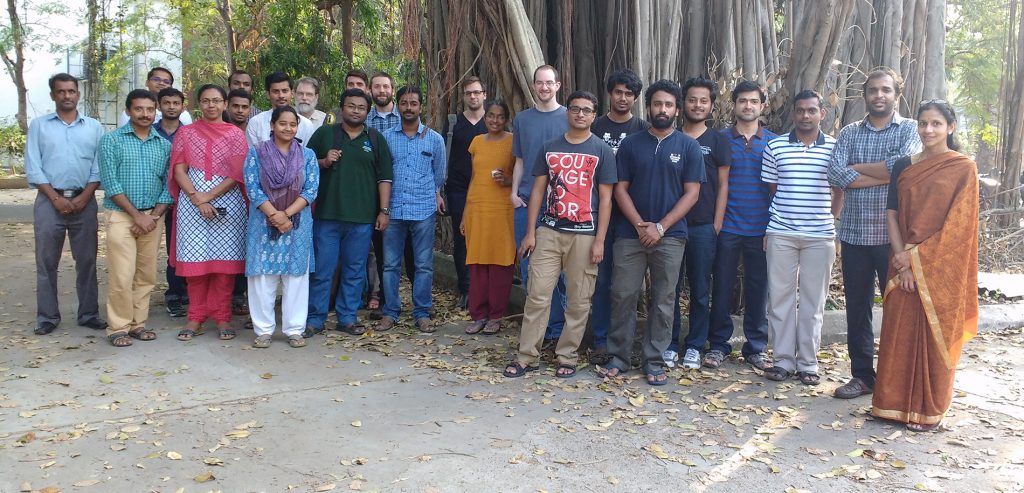News
Air-sea interaction and Monsoonal variability
In January, we (Gualtiero and Amala) participated in a meeting to discuss air-sea interactions and intra-seasonal monsoonal variability in the Bay of Bengal. A workshop was hosted at IIT-Madras along with students and scientists in India.
Read MoreClockwork Ocean in the Baltic Sea
In the summer of 2016, Sebastian Essink participated in the Helmholtz Institute’s observational campaign to study submesoscale eddies in the Baltic Sea that evolve on time scales of less than a day. An airship and airplanes were used to obtain thermal imagery and track chlorophyll at meter-scale resolution. Coastal research vessels operated from the island…
Read MoreChasing Freshwater in the Bay of Bengal
As part of ASIRI, the Air-Sea Interaction Regional Initiative funded by ONR, we are exploring the role of freshwater on air-sea fluxes in order to improve understanding of the South Asian Monsoons. We are on a research cruise on board the R/V Roger Revelle from August 23 to September 21, 2015. Scientists from several institutions including University…
Read MoreScience for Public Video
Oceans and Climate From WGBH in Boston: Learn about the complex and vital relationship between the oceans and Earth’s climate. She and other researchers at Woods Hole describe how they gather climate and monsoon data via remote sensors in the oceans, and she also explains how international teams work on research cruises like the one…
Read MoreSwirling Currents Deliver Phytoplankton Carbon to Ocean Depths
“Much of this particulate organic carbon, especially the larger, heavier particles, sink. But we wanted to find out what is happening to the smaller, non-sinking phytoplankton cells from the bloom. Understanding the dynamics of the bloom and what happens to the carbon produced by it is important, especially for being able to predict how the…
Read MoreMahadevan selected as Radcliffe Fellow
Amala Mahadevan was amongst 50 fellows selected for a fellowship at the Radcliffe Institute for Advanced Study. As a result, she is spending a sabbatical year (2014-15) at Harvard University. During her fellowship year, Mahadevan is devoting time to understanding how the physical complexity of upper ocean dynamics at scales of 0.1–10 kilometers affects oceanic ecosystems. Life…
Read MoreRecent workshop: Life in a Turbulent Environment
Mahadevan, along with Federico Toschi and David Nelson organized a recent workshop at the Radcliffe Institute titled Life in a Turbulent Environment. This workshop convened expertise from the physical, biological and ocean sciences to stimulate a multidisciplinary discussion on how the dynamics of the ocean environment shapes life — ranging from individual plankton and microbes, to…
Read MoreMelissa Omand joins GSO URI as Faculty
Melissa Omand, who joined the lab as a postdoctoral investigator in 2011, has joined the Graduate School of Oceanography at the University of Rhode Island as Assistant Professor. For more information: http://www.gso.uri.edu/blog/gso-welcomes-prof-melissa-omand/
Read MoreScience for the Public
How Plankton Blooms Absorb CO2 From WGBH: Microscopic plankton play a vital role in the ocean’s absorption of atmospheric CO2. And since that absorption represents about one third of the planet’s CO2, scientists are keen to understand this very complex cycle. Dr. Amala Mahadevan explains how ocean eddies shift layers of warm and cold water, so that the…
Read MoreAnimation of Phytoplankton Blooms
An animation based on a three-dimensional model simulation reveals the processes underlying the annual spring phytoplankton blooms in the North Atlantic. This model simulation by Amala Mahadevan (WHOI) is based on a suite of observations made in 2008 by Eric D’Asaro (APL, U. Washington), Craig Lee (APL, U. Washington), and Mary Jane Perry (U. Maine).…
Read More
